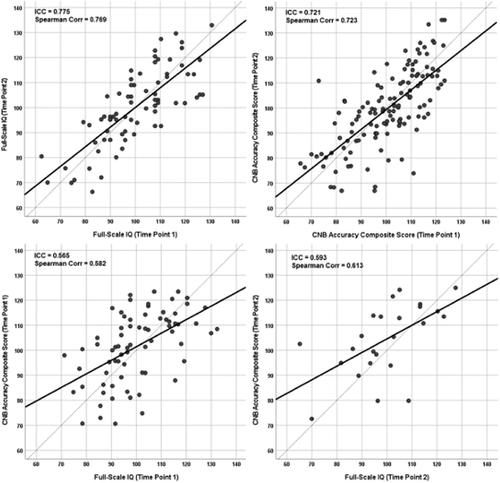当前位置:
X-MOL 学术
›
Brain Behav.
›
论文详情
Our official English website, www.x-mol.net, welcomes your
feedback! (Note: you will need to create a separate account there.)
Relationship between intelligence quotient measures and computerized neurocognitive performance in 22q11.2 deletion syndrome
Brain and Behavior ( IF 2.6 ) Pub Date : 2021-07-02 , DOI: 10.1002/brb3.2221 Ruben C Gur 1, 2 , Tyler M Moore 1, 2 , Ronnie Weinberger 3 , Ehud Mekori-Domachevsky 3, 4 , Raz Gross 3, 4 , Beverly S Emanuel 5 , Elaine H Zackai 5 , Edward Moss 5 , Robert Sean Gallagher 1, 2 , Daniel E McGinn 5 , Terrence Blaine Crowley 5 , Donna McDonald-McGinn 5 , Doron Gothelf 3, 4, 6 , Raquel E Gur 1, 2
Brain and Behavior ( IF 2.6 ) Pub Date : 2021-07-02 , DOI: 10.1002/brb3.2221 Ruben C Gur 1, 2 , Tyler M Moore 1, 2 , Ronnie Weinberger 3 , Ehud Mekori-Domachevsky 3, 4 , Raz Gross 3, 4 , Beverly S Emanuel 5 , Elaine H Zackai 5 , Edward Moss 5 , Robert Sean Gallagher 1, 2 , Daniel E McGinn 5 , Terrence Blaine Crowley 5 , Donna McDonald-McGinn 5 , Doron Gothelf 3, 4, 6 , Raquel E Gur 1, 2
Affiliation

|
Intelligence quotient (IQ) testing is standard for evaluating cognitive abilities in genomic studies but requires professional expertise in administration and interpretation, and IQ scores do not translate into insights on implicated brain systems that can link genes to behavior. Individuals with 22q11.2 deletion syndrome (22q11.2DS) often undergo IQ testing to address special needs, but access to testing in resource-limited settings is challenging. The brief Penn Computerized Neurocognitive Battery (CNB) provides measures of cognitive abilities related to brain systems and can screen for cognitive dysfunction. To examine the relation between CNB measures and IQ, we evaluated participants with the 22q11.2DS from Philadelphia and Tel Aviv (N = 117; 52 females; mean age 18.8) who performed both an IQ test and the CNB with a maximum of 5 years between administrations and a subsample (n = 24) who had both IQ and CNB assessments at two time points. We estimated domain-level CNB scores using exploratory factor analysis (including bifactor for overall scores) and related those scores (intraclass correlations (ICCs)) to the IQ scores. We found that the overall CNB accuracy score showed similar correlations between time 1 and time 2 as IQ (0.775 for IQ and 0.721 for CNB accuracy), correlated well with the IQ scores (ICC = 0.565 and 0.593 for time 1 and time 2, respectively), and correlated similarly with adaptive functioning (0.165 and 0.172 for IQ and CNB, respectively). We provide a crosswalk (from linear equating) between standardized CNB and IQ scores. Results suggest that one can substitute the CNB for IQ testing in future genetic studies that aim to probe specific domains of brain-behavior relations beyond IQ.
中文翻译:

22q11.2缺失综合征智商测量与计算机化神经认知表现的关系
智商 (IQ) 测试是评估基因组研究中认知能力的标准,但需要管理和解释方面的专业知识,并且 IQ 分数不能转化为对可以将基因与行为联系起来的相关大脑系统的洞察力。患有 22q11.2 缺失综合征 (22q11.2DS) 的个体经常接受 IQ 测试以满足特殊需求,但在资源有限的环境中进行测试具有挑战性。简短的 Penn Computerized Neurocognitive Battery (CNB) 提供了与大脑系统相关的认知能力的测量,并可以筛查认知功能障碍。为了检验 CNB 测量值与 IQ 之间的关系,我们评估了来自费城和特拉维夫的 22q11.2DS 参与者(N = 117; 52 名女性;平均年龄 18.8 岁)谁同时进行了 IQ 测试和 CNB,两次管理和子样本之间的最长间隔为 5 年(n = 24) 在两个时间点同时进行 IQ 和 CNB 评估的人。我们使用探索性因素分析(包括整体分数的双因素)估计域级 CNB 分数,并将这些分数(组内相关性 (ICCs))与 IQ 分数相关联。我们发现总体 CNB 准确度得分在时间 1 和时间 2 之间显示出与 IQ 相似的相关性(IQ 为 0.775,CNB 准确度为 0.721),与 IQ 得分良好相关(时间 1 和时间 2 的 ICC = 0.565 和 0.593,分别),并且与适应性功能相似(IQ 和 CNB 分别为 0.165 和 0.172)。我们提供标准化 CNB 和 IQ 分数之间的人行横道(来自线性等式)。结果表明,在未来的基因研究中,人们可以用 CNB 代替智商测试,这些基因研究旨在探索智商之外的大脑-行为关系的特定领域。
更新日期:2021-09-03
中文翻译:

22q11.2缺失综合征智商测量与计算机化神经认知表现的关系
智商 (IQ) 测试是评估基因组研究中认知能力的标准,但需要管理和解释方面的专业知识,并且 IQ 分数不能转化为对可以将基因与行为联系起来的相关大脑系统的洞察力。患有 22q11.2 缺失综合征 (22q11.2DS) 的个体经常接受 IQ 测试以满足特殊需求,但在资源有限的环境中进行测试具有挑战性。简短的 Penn Computerized Neurocognitive Battery (CNB) 提供了与大脑系统相关的认知能力的测量,并可以筛查认知功能障碍。为了检验 CNB 测量值与 IQ 之间的关系,我们评估了来自费城和特拉维夫的 22q11.2DS 参与者(N = 117; 52 名女性;平均年龄 18.8 岁)谁同时进行了 IQ 测试和 CNB,两次管理和子样本之间的最长间隔为 5 年(n = 24) 在两个时间点同时进行 IQ 和 CNB 评估的人。我们使用探索性因素分析(包括整体分数的双因素)估计域级 CNB 分数,并将这些分数(组内相关性 (ICCs))与 IQ 分数相关联。我们发现总体 CNB 准确度得分在时间 1 和时间 2 之间显示出与 IQ 相似的相关性(IQ 为 0.775,CNB 准确度为 0.721),与 IQ 得分良好相关(时间 1 和时间 2 的 ICC = 0.565 和 0.593,分别),并且与适应性功能相似(IQ 和 CNB 分别为 0.165 和 0.172)。我们提供标准化 CNB 和 IQ 分数之间的人行横道(来自线性等式)。结果表明,在未来的基因研究中,人们可以用 CNB 代替智商测试,这些基因研究旨在探索智商之外的大脑-行为关系的特定领域。











































 京公网安备 11010802027423号
京公网安备 11010802027423号